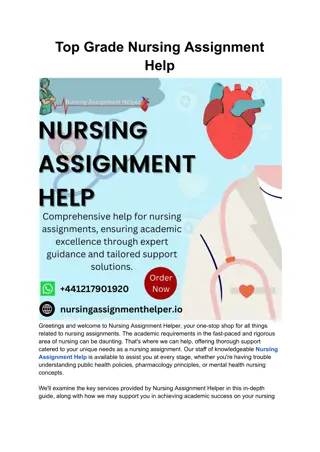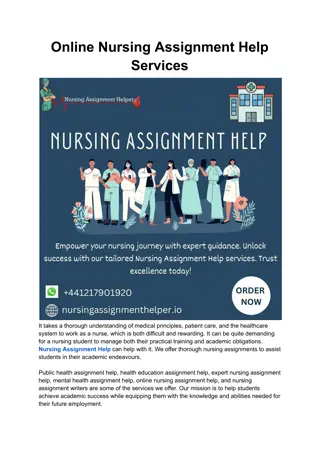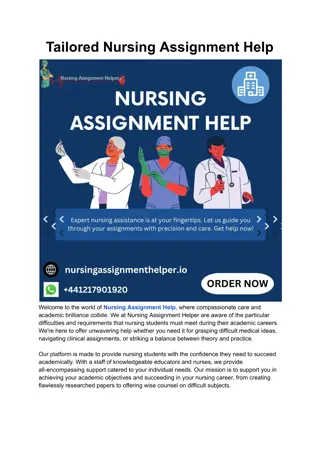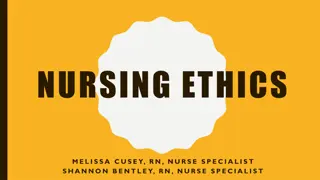Understanding the Vital Role of Research in Nursing
Nursing research plays a crucial role in enhancing patient care by developing knowledge essential for nursing practice. It helps nurses make informed decisions, improve outcomes, and promote evidence-based practice. Through research, nurses can describe, explain, predict, control, and initiate activities to enhance patient care. Understanding the various roles nurses play in research participation is key to advancing the field of nursing.
Download Presentation

Please find below an Image/Link to download the presentation.
The content on the website is provided AS IS for your information and personal use only. It may not be sold, licensed, or shared on other websites without obtaining consent from the author. Download presentation by click this link. If you encounter any issues during the download, it is possible that the publisher has removed the file from their server.
E N D
Presentation Transcript
Introduction to nursing research
Research and Contemporary Nursing The development and utilization of nursing knowledge is essential for continued improvement in patient care. Conducting researches in nursing, as all other sciences, is important to establish a knowledge-base for practice, improvement, and development.
Lecture Outcomes: Describe the defining characteristics of research. Signify the various nurse's roles in scientific research. Compare the value of information generated by research to information found from other sources. Describe research competencies needed by baccalaureate- prepared nurses in order to have an evidence-based practice. Differentiate among the utilization of each of the scientific research types.
Definitions Research: it is a systematic, formal, rigorous, and precise process used to gain solutions to problems or discover and interpret new facts and relationships. Nursing research: is systemic inquiry designed to develop knowledge about issues of importance to nurses, including nursing practice, nursing education, and nursing administration. Research-based practice: using research findings to inform the decisions, actions, and interaction of nurses with clients.
Importance of research in nursing: 1. Emphasizing on the development and utilization of nursing knowledge, which is essential for continued improvement in patient care. Nurses' need to document the effectiveness of their practices not only to the profession, but also to the clients, administrators, and other professionals. - (Thus research findings help them to eliminate nursing actions that do not achieve desired outcomes or to identify the practices that alter health care outcomes and contain costs). Nurses' need for understanding the varied dimensions of their profession, (theoretical, ethical, practical dimensions, etc). 2. 3.
Continue: Importance of research in nursing: 4.Research enables nurses to describe the following: a) The characteristics of a particular nursing situation about which little is known. b) Explain phenomena that must be considered in planning nursing care. c) Predict the probable outcomes of certain nursing decisions. d) Control the occurrence of undesired outcomes. e) Initiate activities to promote desired client behavior.
Roles of nurses in nursing research: It is every nurse's responsibility to engage in one or more roles along the research participation, from these roles are the following: 1. Indirect participation: This is a minimum nurse involvement in a research responsibility. It is done when a nurse read a research report to keep up-to-date on relevant findings that may affect their practice. This level is called "research utilization". Research Utilization: "Is the use of the research findings in a practice setting"
Continue: Roles of nurses in nursing research: 2. Direct participation: in which nurses are nursing research producers. They are actively participating in designing and implementing research studies. 3. Between these two dimensions of research participation, there are a variety of roles for nurses to play, from these roles: a) Attending research presentations at professional conferences. b) Evaluating completed research for its possible use in practice. c) Discussing the implications and relevance of research findings with clients. d) Giving clients information and advice about participation in studies. e) Assisting in the collection of research information (e.g., distributing questionnaires to clients). f) Reviewing a proposed research plan for its applicability in clinical settings. g) Assisting with the development of an idea for a clinical research project.
Sources of knowledge 1. Tradition: Within nursing profession, certain beliefs are accepted as truths (and certain practices are accepted as effective) simply based on customs, (for example, one of the tasks traditionally performed by nurses is the change-of- shift report for each and every patient, whether or not the patient's condition has changed, without proving its productivity and/or effectiveness under certain circumstances). But traditions may undermine effective problem solving.
Continue: Sources of knowledge: 2. Authorities: An authority is a person with specialized expertise and recognition for that expertise. Dependency on nursing authorities (such as nursing faculty) is inevitable. Authorities as a source of information have limitations as: May depend on their personal experiences. Their knowledge often goes unchallenged.
Continue: Sources of knowledge: 3. Personal experience: We all solve problems based on observations and experiences. Personal experiences are based on recognition, generalization, and predictions based on observations. Personal experience has limitations as: o Each person's experience may be too restricted to be useful. o Personal experiences are often biased.
Continue: Sources of knowledge: 4. Trial and error: The trial and error approach to nursing knowledge usually involves multiple attempts to solve a particular problem until a satisfactory solution is found. For example, a pediatric nurse who is caring for immobilized child in the hospital may try a number of different play techniques based on the child's developmental stage until finding one that is effective.
Continue: Sources of knowledge: 5. Intuition: Intuitive knowing is "the ability to understand a situation or phenomena as a whole without reasoning or previous study". It causes a nurse to respond appropriately in unfamiliar situations (as a personal experience). However, controversy exists regarding its validity because it does not conform to the recent requirements for evidence- based practice in health care (that is, intuitive knowing is not predictable, measurable, and generalizable).
Continue: Sources of knowledge: 6. Logical reasoning: Reasoning "is the mental processing of ideas to solve problems". Two intellectual mechanisms are used in reasoning: deductive reasoning and inductive reasoning
Continue: Sources of knowledge: 7. Disciplined research (Scientific research): Research conducted within a disciplined format is the most sophisticated method of acquiring knowledge. Nursing research creates systems of problem solving that tend to be more reliable than other sources of knowledge.
Types of scientific research 1. It seeks to convert observations to numbers, (i.e., to quantify observations about human behavior). The testing of hypotheses based on a sample of observations, and a statistical analysis of the data. Quantitative researchers attempt to describe relationships among variables mathematically and to apply some form of numerical analysis to the examined relationship. Types of questions asked: often describe variables, examine relationships among variables, and determine cause-and-effect interactions between variables. Quantitative research:
Continue types of scientific research 2. Qualitative research: It emphasizes verbal descriptions and explanations of human behavior, (i.e., careful and detailed descriptions of life experiences in an attempt to understand how the participants experience and explain their own world and give meaning to it). The tools for gaining information include: participant observation, in-depth interviews, or an in-depth analysis of a single case
Descriptive Vs Explanatory Vs Predictive research: A. Descriptive research (Exploratory research): It emphasizes the accurate description of some aspect of society. A researcher may wish to assess specific characteristics of individuals, groups, situations, or events by summarizing the commonalities found in discrete observations. The descriptive research is directed toward studying "what" and how many of this "what". Thus, it is directed toward answering questions such as, "WHAT IS THIS?".
Continue Descriptive Vs Explanatory Vs Predictive research: B. explanatory research: Its primary goal is to understand or to explain relationships. It uses correlations to study relationships between dimensions or characteristics of individuals, groups, situations, or events. Explanatory research explains (HOW THE PARTS OF A PHINOMINON ARE RELATED TO EACH OTHER). Explanatory research asks the "WHY" question.
Continue Descriptive Vs Explanatory Vs Predictive research: C. Predictive research: This type of research moves beyond explanation to the prediction of precise relationships between dimensions or characteristics of a phenomenon or differences between groups. The area of health promotion provides a rich source for predictive studies on the impact of such intervention on health outcomes in various populations.
Basic (pure) Vs applied research: a) Basic research: This type of research focuses on understanding phenomena of interest. It is conducted to accumulate information, extending the base of knowledge in a discipline to improve understanding, or to formulate a theory. Basic research is appropriate for discovering general principles of human behavior and biophysiology processes.
Continue Basic (pure) Vs applied research: b.) Applied research: This type of research focuses on finding an immediate solution to an existing problem. Applied research is designed to indicate how the principles of human behavior can be used to solve problems in nursing practice.
Characteristics of a scientific research: The good scientific research should have the following characteristics: 1. Should include a problem that need a solution or a question that need an answer. 2. Should achieve a general objective rather than a personal objective. 3. It should follow the scientific approach that characterized by order and control. 4. It should add new information through: a) New facts that was not known before. b) Validates results of previous research. c) Tests theories. d) Explains findings of a previous research. e) Find out new relationships among present phenomena.
Continue Characteristics of a scientific research: 5. Research results should be liable to: a. Testing _______ when another researcher choose the same problem and follows the same steps, he/she probably gets the same results. b. b. Generalization ______ that is the results could be generalized from the study sample to the study population. 6. The research should be ethical (i.e., does not violate the rights of patients, profession, community, or the researcher him/her self).
Limitations of the scientific research: 1. It is inadequate for addressing moral or ethical questions (e.g., Should abortion be legal?). 2. It must contend with problems of measurement, thus, any phenomena must be translated to measurable items. 3. It typically focuses on a relatively small portion of the human experience (e.g., weight gain, depression) in a single study.























